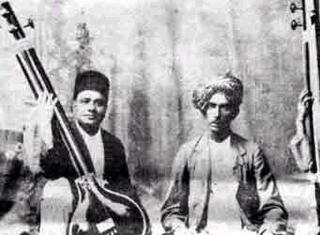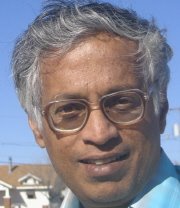Ustad Abdul Karim Khan, legendary vocalist
Dr. K. Rohiniprasad

 With his disciple Sawai Gandharva, who in turn taught contemporary giants like
With his disciple Sawai Gandharva, who in turn taught contemporary giants likeGangubai Hangal, Bhimsen Joshi and others
One of the present day icons of Indian classical music, Pandit Bhimsen Joshi, belongs to the Kirana gharana that was founded by Abdul Karim Khan (1872-1937). Karim Khan belonged to a family of illustrious musicians. At a young age, apart from vocal music, he learnt to play the sarangi, sitar, tabla, jaltarang and several other instruments. Karim Khan left his native place Kirana near Kurukshetra in 1890, never to return. He attained cult status after he came to Maharashtra via Baroda and trained several disciples including stalwarts like Sawai Gandharva, Sureshbabu Mane, Hirabai Barodekar, Roshanara Begum et al. They in turn trained musicians like Gamgubai Hangal, Feroze Dastur, Bhimsen Joshi, Prabha Atre and others who became torch-bearers of Kirana gharana. In his time, Karim Khan’s admirers included Lokamanya Tilak, Gopal Krishna Gokhale, Rabindranath Tagore and others.
Karim Khan was initially a court musician in Baroda. He fell in love with and later married Tarabai Mane, the Maharaja’s niece, who was one of his disciples. As a result he was forced to leave Baroda. The couple settled at Miraj in south Maharashtra. Karim Khan established music schools at Belgaum, Miraj, Pune and in Bombay. He also pioneered the selling of tickets at classical music performances for collecting funds in aid of these schools. Tarabai left him in 1922 but worked hard to help her five talented children Sureshbabu Mane, Hirabai Barodekar, Kamalabai, Saraswati Rane and Krishnarao Mane. The separation was a shock to Karim Khan, and his music reportedly changed as a result, expressing pathos and sorrow. Others attribute this to the influence of Rahmat Khan of Gwalior gharana.
Karim Khan is one of the earliest Indian musicians whose recorded music is available for us. He recorded 32 songs first in 1905, each of 90-150 seconds duration, in Bombay at S. Rose & Co. – a place near the present Rhythm House. Some of them were reissued by HMV in 1994. After initial reluctance, he was persuaded to record for the German Odeon company in 1932-36. These included about 25 songs, each of 4-5 minutes duration, featuring classical, light classical, Marathi natya sangit, bhajans, Kannada songs as well as instrumental music for the Been. In the presence of Sir C.V.Raman, he demonstrated his musical theory of notes with the help of 2 veenas in a public meeting.
One of the characteristics of the Kirana gharana has been an emphasis on melody or swar rather than laya. His phenomenal popularity is due to expansive alapchari which unfolds the raga note by note with tantalising languor. Besides khayal singing, the Ustad is also very famous for his soulful rendition of thumris. In this genre, his approach differed from the Purab ang and the Patiala styles. His thumris like ‘Piya Ke Milane Ki Aas’ in raga Jogiya and ‘Piya bin nahi avat chain’ (briefly rendered by K.L.Saigal in Devdas) in raga Jhinjhoti still retain their magic so many years after his death.
Karim Khan’s visits to Mysore, (where he was honoured with the title ‘Sangeet Ratna’) brought him in contact with Carnatic music. As a result he pioneered the rendering of Carnatic ragas like Abhogi, Kirawani and inducted sargam into Hindustani music. He inspired several South Indians to listen to, appreciate and learn Hindustani music. He spent life like a saint, wandering from place to place giving performances and training disciples. In 1937, on his way to Pondicherry he broke journey at a small station and sang his prayers in Raga Darbari before going off to sleep for ever.
Karim Khan was one of the earliest to attain national stature as a classical vocalist and he is remembered through the present day luminaries of his gharana. His music is available on cassettes.



2 Comments:
sir i read your blog for abdul karim khan. excellent!
my blog is www.santshali.blogspot.com
Sir,
I am interested in knowing if Ustad ever stayed in Meerut (a prominent district in western UP).if so was in in "Gavviya Gali"?
please respond early because my friend Dr Aalam, a prominent national theater director is wanting to make a documentary on his stay in Meerut.
regards
colonel dk sharma
Post a Comment
<< Home